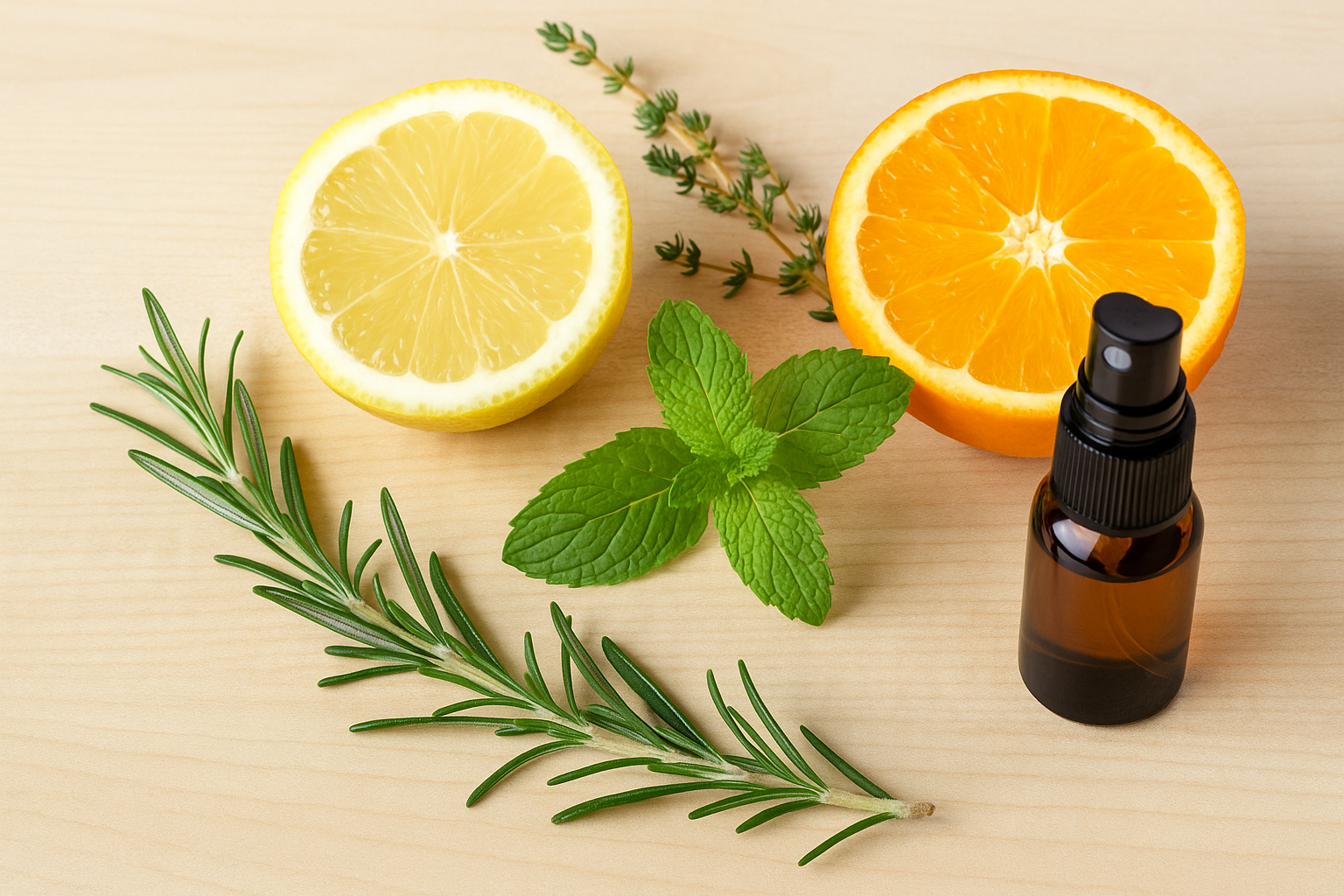Insects are part of nature, but they are not always welcome in our homes. Mosquitoes buzz in the summer heat, ants sneak into kitchens, and moths quietly damage clothes.
Commercial insect repellents often rely on synthetic chemicals like DEET or pyrethroids. While effective, they can irritate skin, harm pets, and pollute the environment.
The good news is that herbs and citrus provide natural defenses against insects. For centuries, people burned herbs, rubbed citrus peels on skin, and hung sachets in wardrobes to repel pests.
These methods are safe, eco-friendly, and surprisingly effective when prepared correctly.
This guide explores the science behind natural repellents, the herbs and citrus that work best, and offers recipes for sprays, candles, sachets, and oils.
It also includes seasonal variations, traditional practices, and answers to common questions. By the end, you will have a complete toolkit for keeping insects away—naturally.
Why natural repellents work
Plants produce essential oils to protect themselves from insects and predators. These compounds, like citronellal in citronella or limonene in citrus, confuse insects’ sensory systems.
Some repel mosquitoes, others deter ants, moths, or flies. Unlike chemicals that kill insects, natural repellents discourage them from coming near.
Benefits of DIY insect repellents
They are safer for children and pets. They avoid toxic residues in the home. They cost less than commercial repellents. They can be customized for scent and strength. They preserve cultural traditions of using herbs for protection.
Key herbs for repelling insects
Citronella
Classic mosquito repellent, extracted from lemongrass.
Rosemary
Repels mosquitoes and flies, easy to grow and use.
Sage
Burned in bundles to deter insects indoors and outdoors.
Mint
Freshens air while discouraging ants and flies.
Lavender
Calms the mind and repels moths and mosquitoes.
Marcela
Traditional Gaúcho herb that calms and keeps away insects.
Eucalyptus
Powerful against mosquitoes, also disinfects air.
Citrus for repelling insects
Citrus peels release limonene, which confuses insect receptors. Lemon and orange discourage ants. Lime and grapefruit repel mosquitoes. Dried peels can be used in sachets or simmer pots, while fresh juice enhances sprays.
Basic spray recipe
- 200 ml distilled water
- 2 tbsp witch hazel or alcohol
- 10 drops citronella oil
- 6 drops lemon oil
- 4 drops rosemary oil
Shake before use. Spray on skin, curtains, or doorways. Reapply every 2 hours outdoors.
Herbal and citrus variations
Cooling Mint Spray
- 200 ml water
- 10 drops peppermint oil
- 6 drops lemon oil
- 4 drops lavender oil
Rosemary-Lemon Kitchen Spray
- 200 ml water
- 2 tbsp vinegar
- 10 drops rosemary oil
- 6 drops lemon oil
Marcela-Calming Spray
- 200 ml water
- 10 drops marcela oil
- 6 drops orange oil
- 4 drops sage oil
Insect-repelling candles
Classic Citronella Candle
- 100 g soy wax
- 10 drops citronella oil
- 6 drops lemon oil
Herbal Outdoor Candle
- 100 g soy wax
- 8 drops rosemary oil
- 6 drops sage oil
- 4 drops eucalyptus oil
Calming Night Candle
- 100 g soy wax
- 10 drops lavender oil
- 6 drops marcela oil
Herbal sachets
Fill cotton bags with dried herbs and citrus peels. Place in wardrobes, drawers, or under cushions.
Anti-moth sachet: lavender, rosemary, dried lemon peel.
Ant deterrent sachet: mint, sage, orange peel.
Mosquito sachet: marcela, citronella leaves, eucalyptus.
Simmer pots for home defense
Boil water with herbs and citrus to fill the house with insect-repelling fragrance.
Summer blend: lemon slices, rosemary sprigs, mint leaves.
Autumn blend: orange slices, sage, cloves.
Winter blend: marcela, eucalyptus, lemon peel.
Body oils for personal protection
Outdoor Protection Oil
- 2 tbsp coconut oil
- 10 drops citronella
- 6 drops eucalyptus
- 4 drops rosemary
Apply to arms and legs before going outside.
Gentle Children’s Oil
- 2 tbsp almond oil
- 6 drops lavender
- 4 drops chamomile
Safe for kids over 3 years old.
Traditional roots of natural repellents
In Gaúcho households, herbs were burned on coals to repel insects. Citrus peels were rubbed on skin before outdoor work. Rosemary sprigs were tied near doors and windows. These practices reflect deep knowledge of plants’ protective powers.
Seasonal routines
Spring
Lavender and lemon sachets in wardrobes.
Summer
Citronella candles outdoors, mint sprays in kitchens.
Autumn
Sage bundles burned weekly to keep pests away.
Winter
Marcela sprays and eucalyptus simmer pots for calm protection.
Mistakes to avoid
Do not overload essential oils; too much can irritate skin. Do not spray directly on pets. Do not expect sprays to last all day—reapply often. Do not leave candles unattended.
Designing a natural insect control plan
Daily
Spray doorways and windows with rosemary-lemon blend.
Weekly
Vacuum and sprinkle baking soda with lemon oil on carpets.
Monthly
Refresh sachets with new herbs and citrus peels.
Seasonal
Switch blends for stronger protection during mosquito season.
Frequently Asked Questions
Do natural repellents work as well as DEET?
They are effective for shorter periods. Reapply every 2–3 hours for strong protection.
Can I use these sprays on pets?
Not directly. Some oils, like tea tree, are toxic for cats. Use only pet-safe blends recommended by vets.
Will vinegar repel insects?
Yes, especially ants and flies. Mix with lemon or rosemary for stronger effect.
Can I burn herbs instead of making candles?
Yes. Bundles of rosemary, sage, or marcela can be burned safely outdoors.
Are citrus peels alone effective?
They work moderately but are stronger when combined with oils and herbs.
Can I use these repellents on children?
Yes, but stick to gentle oils like lavender, chamomile, and lemon, and avoid direct use on babies under 2 years.
How long do sachets last?
About one month. Refresh with new herbs or add drops of essential oils.
Do these blends stain fabrics?
Sprays are safe if diluted, but always test on hidden areas.
Conclusion
DIY natural insect repellents with herbs and citrus are safe, affordable, and eco-friendly. They rely on nature’s own defenses—citronella, rosemary, lavender, marcela, lemon, and orange—to protect your home and family.
With sprays, candles, sachets, simmer pots, and oils, you can design a complete defense system without synthetic chemicals.
These solutions preserve cultural traditions, protect health, and respect the environment. Every herb and peel used is more than a repellent—it is a connection to natural wisdom that makes modern life healthier and more sustainable.

Marcela Cardozo is passionate about Southern Brazilian traditions and the cultural stories carried through natural scents. She blends knowledge of native herbs, essential oils, and regional rituals to create practical and inspiring content. Her writing connects ancestral wisdom with modern living, offering readers simple ways to bring authenticity, well-being, and meaning into their everyday lives.
